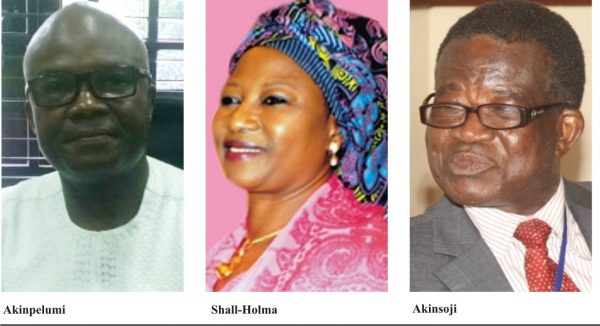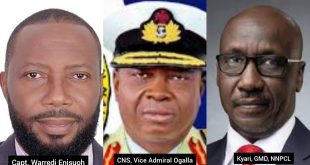 By Kenneth Jukpor
By Kenneth Jukpor
Africa is blessed with an amiable linkage via coastal areas and inland waterways that is seen as a gift everywhere in the world. Yet, Africa and its alleged giant ‘Nigeria’ have been unable to gainfully harness this natural geographic advantage for economic benefits.
While the host communities simply explore the opportunities for fishing, the larger society and the government have barely looked beyond to provide a means of mobility and a logistics interface for the region. Nevertheless, in trade, mobility remains a key component and a nation’s economy scarcely grows unless it is able to harness the potentials available to it for transportation and other logistics services.
When former President Olusegun Obasanjo gave the directive for the development of a project termed ‘sealink’ in 2003, a lot was expected from it and the expectations remain unruffled as the maritime sector in the country and Africa at large is in dire need of the solutions the project could offer.
Some of the expected benefits include; reduction in transportation costs; eliminating the need for cargo trans-shipment in Europe for Intra-African trade; increasing trade volume and improved efficiency in transportation in the Sub-region; and to boost economic growth and development for Nigeria.

The initiative is tipped to reduce the cost of moving cargo among the countries of the Joint Development Zone (JDZ) which are Nigeria, Equatorial Guinea, and Sao Tome and Principe. It is also expected to increase maritime and trade activities among the countries by ensuring payment of duty only on goods delivered to the ports of final destination; and improve frequency of maritime services between African nations and ultimately improve commerce in and around the entire Gulf of Guinea.
Speaking with MMS Plus during the 2018 Nigeria International Maritime Ports and Terminals Conference and Expo (NIMPORT) the Chairperson Sealink Implementation Committee (SIC) Mrs. Dabney Shall-Holma revealed that the much anticipated sealink project was edging closer to full implementation.
According to Shall-Holma, the first presentation by SIC had been made to the economic management team of the Federal Government.
Speaking on the legislative framework for the project, she told our correspondent that sealink was “standing on the legislation created by the national fleet under Nigerian Maritime Administration and Safety Agency (NIMASA). That’s why NIMASA is part of the project”
Meanwhile she recalled that the Presidential approval was given in 2003; “The Presidential approval has been there since former President Olusegun Obasanjo gave the instruction. The terminology was coined from the statement which said, “I approve that you go into the Gulf of Guinea and create a sealink”. We have a presidential approval for that, but there are so many legislations in Nigeria that supports the development of National fleet and capacity building”
She noted that the major area Sealink had consortium strength was in vessel acquisition as the project was acquiring sixty brand-new barges as well as passenger vessels, tanker vessels and cruise vessels.
“Our vessels aren’t acquired by individuals; rather we have guarantees from African Development Bank (AfDB), African Export-Import Bank (Afreximbank) and the Nigerian Import and Export (NEXIM) Bank. This is the beauty of sealink. We are supported by strong financial institutions so we gave guarantees from our financiers to support the release of these vessels. It isn’t a cash exchange but an assurance because NEXIM, AfDB and Afreximbank are our financial advisers as well as promoters of the project. This means that they are the financial agencies taking control of the finance of the organization” she said.
Explaining the potentials of inland waterways she said, “1500 tonnes of a barge on the Inland waterways can take nearly 350 trucks off the road and rail tracks. Inland waterways transport is more efficient and cost effective. It is actually the cheapest form of transport and it is also eco-friendly. Anytime you’re skidding along the waterways it doesn’t create so much pollution especially if you are using vessels that operate with eco-gas or biofuel. The pollution is also minimal with vessels that use diesel because the craft is small”.
She stressed that the sealink implementation committee was working with conglomerates and multinationals that could transform the river ports in the country.
“The multinationals can create ideal river channels for proper channelization, mappings and navigational aids that would make it look like the modern river. If you go to other countries like Egypt, you would love to be on the river because it is properly channeled and vessels are moving up and down the Nile in an orderly manner. This is a wonderful thing because the cargo that is serving the Port Alexandria and Port Said in Egypt are coming from the River Nile. Why can’t we do the same thing here in Nigeria? It is easy and it is doable. We just need to have the will to do it. Once we have the will, we would find the way to do it”, she added.
Meanwhile, the former Rector of Maritime Academy of Nigeria (MAN) Oron, Engr. Olu Akinsoji referred to the sealink project is a fantastic initiative because it would be able to generate the cargo.
“Nigeria is potentially rich but the problem is that the nation isn’t harnessing its potentials. With sealink project, we can begin to set things right for the nation and the whole of Africa because it generates cargo for the vessels. Sealink is combining shipping, transshipment and generation of cargo and in this process we are also going to generate a lot of employment” he told MMS Plus.
According to Akinsoji, the initiative is one that every stakeholder in the maritime industry should be proud of and make efforts to participate in the project.
“It may take some time before it comes onboard but it is a project that would bring a lot of progress for shipping in the country and the continent at large” he added.
Recognizing the fact that a lot of Nigerian seafarers are lying fallow as a result of the lack of seatime experience, the Lagos Coordinator – Nigerian Indigenous Ship-owners Association (NISA), Capt. Taiwo Franklin Akinpelumi noted that the initiative would create opportunities for seafarers to get seatime experience while it also guarantees employment prospects for certified cadets.
While Capt. Akinpelumi decried NIMASA’s recent fallacious assertion that a total of 2,337 seafarers have had the opportunity of acquiring the mandatory seatime experience onboard vessels, he welcomed the idea that the sealink project had a clause in its the manual that emphasized that 70%-75% of the crew will come from Nigeria.
The SIC Chairperson, Shall-Holma told our correspondent that this clause was in the project’s manual that was sent to the government.
“We know that sealink project is a collaborative efforts by several African countries but Nigeria is doing most of the funding so, 70%-75% of the crew will come from Nigeria and we insisted on that. This clause is in the manual that has been sent to the government” she said.
While NIMASA continues to send cadets abroad for training and seatime experience under the auspices of Nigerian Seafarers Development Programme (NSDP), the emergence of sealink project may just be the soothing relief for many disenchanted seafarers by providing the platform for them to acquire seatime as well as permanent employment opportunities.
Engr. Akinsoji who was one of the early sponsors and supporter of the NSDP initiative laments; “I was a party to the NSDP initiative but as soon as we conceived the initiative, the authorities went ahead to implement it without any solid plan. I’m still not aware if any plan has been developed for NSDP because seafarers’ training requires strategic plans for shore-based training, seatime training as well as eventually placement on ships. Nigeria doesn’t have ships, so you can see sealink as a massive development to solve this problem”
 MMS PLUS NG – Maritime, Aviation, Business, Oil and Gas News Online Newspaper with coverage in Maritime, Oil and Gas, Aviation, Power and Energy as well as Financial News
MMS PLUS NG – Maritime, Aviation, Business, Oil and Gas News Online Newspaper with coverage in Maritime, Oil and Gas, Aviation, Power and Energy as well as Financial News









